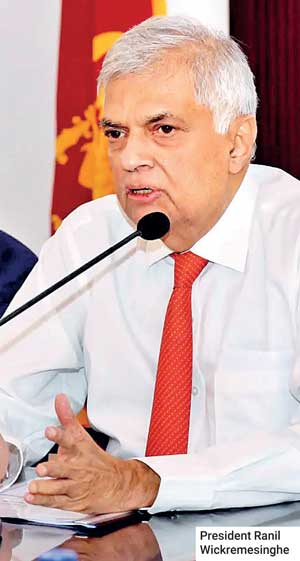Sunday Feb 22, 2026
Sunday Feb 22, 2026
Tuesday, 15 August 2023 00:00 - - {{hitsCtrl.values.hits}}
 By Uthpala Nishadini Karunasinghe
By Uthpala Nishadini Karunasinghe
The Presidential pardon has once again become a controversial issue which is highly discussed within the Sri Lankan society with the recent incident of releasing convicted LTTE cadres involved in the Central Bank bomb attack on the pardon granted by the incumbent president Ranil Wickremesinghe on 18 July. In the verdict at the Colombo High Court, Judge Sarath Ambepitiya found the accused guilty and sentenced to death. The Central Bank attack is observed as one of the series of destructive attacks launched by the LTTE targeting economically vulnerable locations during the past war time.
Presidential pardon is a prominent platform for critics of executive powers vested in the President by the 1978 Constitution of Sri Lanka, thereby allegedly challenging the democratic framework of the prolonged parliamentary system. Presidential pardon stipulated in the Article 34(1) of the constitution is applicable to the court ruling on punishments for offenders. The relevant article has clearly prescribed the proceedings of exercising the power on Presidential pardon.
The said Article is formulated with bona fide intention for giving relief to the inmates of prisons considering their good behaviour during the imprisonment. However it is clearly observed that from the inception, power of Presidential pardon has been abused and misused by consecutive presidents who came to power. Some decisions taken by them to use power on Presidential pardon to release high profile prisoners cannot be accepted and justified at all. The recent incident of release of pro LTTE prisoners on Presidential pardon is cited as a continuation of the practice in view of gaining their own political mileage.
The anatomy of the social hazard could be clearly viewed through the similar occurrences mentioned below.
On 26 March 2020 former President Gotabaya Rajapaksa granted Presidential pardon to ex Army soldier named Sunil Ratnayake who was convicted and sentenced to death for the brutal massacre of eight civilians including three children at Mirusuvil. He was sentenced to death by a Trial at the Bar Bench of the Colombo High Court in June 2015. (Ratnayake Mudiyanselage Sunil Ratnayake Vs Hon. Attorney General SC TAB 01/2016) and the said ruling was affirmed by the five-member bench of the Supreme Court. On one hand, the majority of people have failed to identify the impact of this type of crucial action on the society because of lack of the knowledge of legal understanding and on the other they have been misguided and misled by tricky politicians to achieve their ulterior motives.
The other controversial Presidential pardon has come to light during the tenure of ex President Maithripala Sirisena who granted relief on Presidential pardon to another prisoner identified as Don Jude Shramantha Jayamaha who was convicted and sentenced to death for the renowned murder case of Royal Park. He was convicted by the Court of Appeal in 2012 and the Supreme Court affirmed the ruling in 2014. It is viewed that the unacceptable influences from some power hunting political icons had compelled the Executive to reach the decision on granting Presidential pardon for the particular prisoner.
Further, one Mary Juliet Monica Fernando, wife of a former minister who was sentenced to death for double murder in 2005 is another occasion of granting Presidential pardon to the prisoner during the governance by ex President Mahinda Rajapaksa. Although an external reason for the decision was announced as to mark International Women’s Day, the critics pointed out that the hidden motive was completely different. The cases reviewed above are among other more similar occurrences where the power vested in the executive presidency on presidential pardon is used as a political tool and the continuation of the practice is witnessed throughout the history for the survival of power greedy politicians.
In terms of Article 118(C) of the Constitution the Supreme Court of Sri Lanka is named as “Highest and Final Superior Court of record in the Republic” but in this context, it is not confirmed whether this notion is absolutely true and accurate.
The above discussed cases are few among others that adversely affect the whole judicial system and the rule of law as well. The supremacy of the ‘highest and final Superior Court of Sri Lanka” has been ultimately subjected to be challengeable. In order to avoid the negative impact of exercising the power of Presidential pardon an introduction of proper mechanism of check and balance is highly required.
Accordingly, power on presidential pardon is now subject to judicial review after the 19th Amendment to the Constitution. However it is questionable whether the real mechanism is practically in operation as described in the Constitution. The physical appearance of the above contended cases indicate the less accountability and transparency of the system of power checking of the concept of Presidential pardon.
Deputy solicitor General Nerin Pulle stated that: “Granting pardon to a convict by the Executive President is an absolute power conferred on the Executive president that cannot be challenged under a fundamental rights petition in the Supreme Court.”
The Deputy Solicitor General made his assertion in the Fundamental Rights petition of the Supreme Court against the presidential pardon of Jude Shramantha Jayamaha on 17 July 2023 in the inquiry before the Three Bench Judges and his submission was postponed for further inquiry.
The sovereignty and independence of the judiciary system and the rule of law have already faced a great challenge due to the power exercised by the Executive President on granting pardon to the jailed prisoners. The above remarks evidently suggested that the justice is silent beneath the arbitrary power of the Executive Presidency and so that the question whether people are enjoying the benefits of the real judicial system is still remaining unanswered.
(The writer is an Attorney-at-Law.)